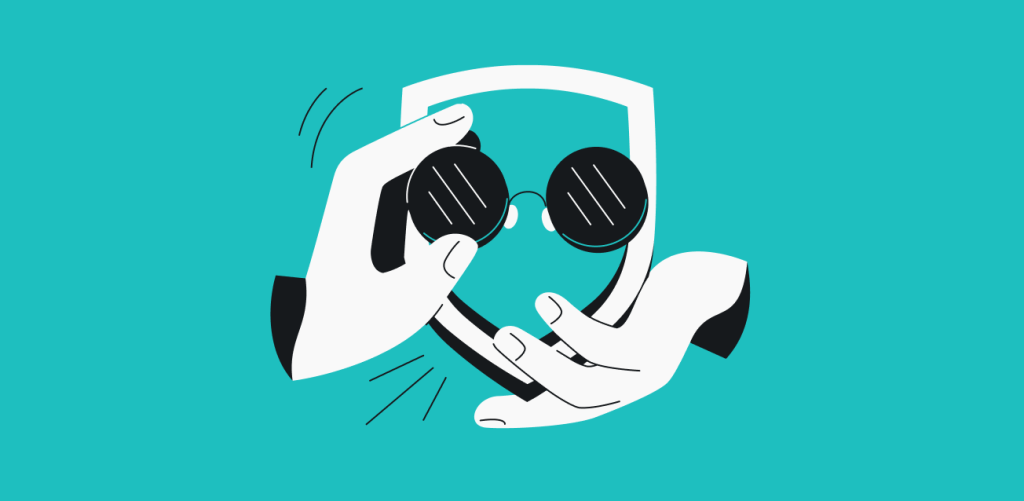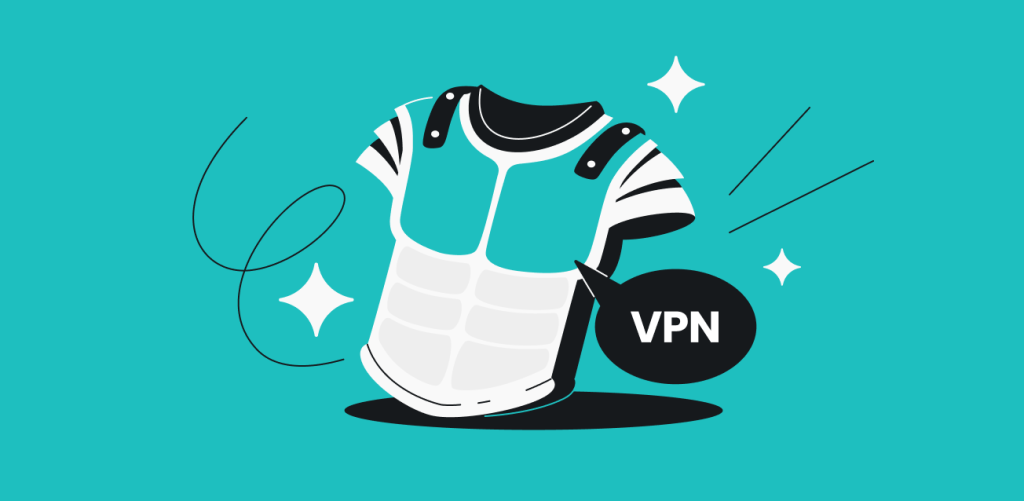
Anonymity is one of the prime reasons many are in the market for a reliable VPN (Virtual Private Network). And it makes complete sense. After all, online surveillance, tracking, targeted ads, and cyberattacks are all very real threats today.
So, to save you from a manic search for the most anonymous VPN, I’ve rounded up the best anonymous VPN options that actually keep your data safe. Read on to find out what each has to offer when it comes to safeguarding your identity.
Table of contents
How can an anonymous VPN protect you?
A VPN is indispensable for protecting your online privacy. And while no VPN can guarantee 100% anonymity, the finest VPNs can significantly increase your online anonymity by:
- Encrypting your traffic: a VPN scrambles all the data traveling between your device and the internet to make it unreadable even if intercepted. So, whatever you do online is safe from prying eyes and snooping parties.
- Masking your IP (Internet Protocol): your IP address is like a unique digital badge. It carries identifying information whether you’re ordering a pet toupee, leaving a Yelp review, or researching UFO conspiracy theories. When you connect to a VPN server, your IP address is replaced by the server’s IP address. This way, your actual IP address remains private.
- Blocking ISP (Internet Service Provider) tracking: ISPs are known to collect and retain data on your online activities. This data is often sold to advertisers for targeted ads or shared with government agencies. Luckily, you can easily foil this effort to profit from your data with a VPN that encrypts your traffic and masks your IP.
How to choose the best VPN for anonymous use
There are a few crucial criteria to remember when hunting down the best VPN for anonymous use:
- Encryption: the most reliable providers use AES-256 for OpenVPN and IKEv2 protocols. A few premium VPN services, including Surfshark, also use ChaCha20 for WireGuard.
- RAM-only servers: RAM-only servers enhance anonymity by ensuring all data is automatically erased upon reboot. However, despite their importance, only some providers use 100% RAM-only servers. Surfshark is, of course, one of them.
- Features: look for features that promote anonymity. For instance, obfuscated servers help to foil oppressive restrictions. Meanwhile, double VPN routes your traffic through two servers for an added layer of security.
- No-logs policy: a no-logs VPN is crucial for anonymity as it ensures that the service provider doesn’t track and store your online activities. However, a no-logs claim alone isn’t enough. The most trustworthy VPNs also substantiate these claims with independent audits. For instance, Deloitte has verified Surfshark’s no-logs policy.
- Jurisdiction: opt for a VPN with headquarters in a privacy-friendly country with no data retention laws. The Netherlands, where Surfshark is based, is one of those countries.
What is the best VPN for anonymity?
To find the best VPN service for anonymity, we need to compare the top VPN options and what they bring to the table. Let’s take a closer look:
Surfshark
Surfshark’s presence on this list isn’t exactly a surprise; you’re reading Surfshark’s blog, after all. Yet, I believe that Surfshark will find its way onto any best VPN for anonymity list for the strength of its privacy features.
For starters, Surfshark uses AES-256 for encryption. Widely regarded as the industry standard, the cipher is nearly impossible to decrypt with current technology. Surfshark then pairs this secure encryption with modern VPN protocols to ensure your data remains consistently protected from potential threats.
Encryption aside, Surfshark is one of the first providers to switch from hard drive to 100% RAM-only servers. With this upgrade, all server data is wiped upon reboot to minimize the chances of unauthorized access and tampering.
Surfshark also offers ample additional features to enhance anonymity. For instance, its MultiHop (double VPN) provides an extra layer of privacy by funneling your traffic through two different servers. Meanwhile, the VPN’s obfuscated servers are a great tool to help overcome oppressive restrictions. Additionally, Surfshark accepts cryptocurrency payments.
Moreover, Surfshark’s has a strict no-logs policy that has been independently verified by Deloitte — one of the Big Four auditing firms. And let’s not forget that Surfshark’s headquarters are in the privacy-friendly Netherlands.
Surfshark | |
|---|---|
Encryption | AES-256-GCM |
RAM-only servers | Yes |
Other privacy-focused features | Obfuscated servers, Dynamic MultiHop |
No-logs policy | Audited |
Country | The Netherlands |
NordVPN
Another excellent all-around VPN, NordVPN, also employs AES-256 for encryption. When it comes to infrastructure and features, you get a full lineup, including 100% RAM-only servers, double VPN for double encryption, and obfuscated servers. You can even choose to pay with cryptocurrency for added anonymity.
At the same time, NordVPN solidifies its reputation as one of the best no-logs VPN services by having its no-logs policy verified by PricewaterhouseCoopers (PwC) and Deloitte. And, like Surfshark, NordVPN operates out of a privacy-first country — Panama.
To learn more about how NordVPN stacks up to Surfshark, check out our comparison article on Surfshark vs. NordVPN.
NordVPN | |
|---|---|
Encryption | AES-256-GCM |
RAM-only servers | Yes |
Other privacy-focused features | Obfuscated servers, double VPN |
No-logs policy | Audited |
Country | Panama |
ExpressVPN
A fellow veteran VPN, ExpressVPN also uses AES-256 encryption to keep your online activities private. And, with the VPN being an early adopter of the RAM-only technology, you can be assured that it deletes your data with each reboot.
On the subject of features, you can expect the basic stuff like Stealth Mode (obfuscation) but no advanced or additional ones such as double VPN. As for anonymous payment methods, ExpressVPN is very flexible and accepts Bitcoin, Ethereum, and XRP, as well as a variety of cryptocurrency tokens.
ExpressVPN’s no-logs policy — audited and verified by PwC and Cure53 — is a plus for those looking for a VPN service that doesn’t keep logs. Another point in ExpressVPN’s favor is that it’s incorporated in the British Virgin Islands, which has strong privacy laws.
Read our Surfshark vs. ExpressVPN article for a more detailed comparison of the two VPNs.
ExpressVPN | |
|---|---|
Encryption | AES-256-GCM |
RAM-only servers | Yes |
Other privacy-focused features | Stealth mode for obfuscation |
No-logs policy | Audited |
Country | British Virgin Islands |
CyberGhost
Like Surfshark, CyberGhost safeguards your data with AES-256 encryption and RAM-only servers. To further protect your anonymity, you can also pay with Bitcoin. However, CyberGhost still has room for improvement as it lacks additional privacy features such as a double VPN.
Features aside, it’s worth noting that Deloitte has audited CyberGhost’s no-logs policy. Yes, the same Deloitte that verified Surfshark. Moreover, CyberGhost’s headquarters are located in privacy-friendly Romania. That’s a definite perk for those searching for greater anonymity.
Dive deeper into how these two VPN providers compare with our Surfshark vs. CyberGhost article.
CyberGhost | |
|---|---|
Encryption | AES-256 |
RAM-only servers | Yes |
Other privacy-focused features | Kill Switch |
No-logs policy | Audited |
Country | Romania |
PIA
Bucking the trend, Private Internet Access (PIA) is the only provider on this list that lets you choose between AES-128 and AES-256 encryption. That said, it’s best to pick AES-256 for a higher level of security.
Apart from this, PIA shares many similarities with Surfshark. In its arsenal, PIA also has RAM-only servers and various privacy-boosting features, including an obfuscation tool and a double VPN feature. Similarly to Surfshark, Deloitte has audited PIA’s no-logs policy.
Moreover, PIA supports privacy by accepting cryptocurrency as a payment option. Uniquely, it also supports PayGarden, which lets you pay for your VPN using gift cards.
The only cause for concern here is that PIA is based in the USA. As an active member of the Five Eyes alliance, the USA isn’t the optimal place for the headquarters of a VPN. Even more so for a VPN that emphasizes its commitment to privacy and anonymity.
Want to know more? Head to our comparison article for a full breakdown of Surfshark vs. PIA.
PIA | |
|---|---|
Encryption | AES-128 and AES-256 |
RAM-only servers | Yes |
Other privacy-focused features | Obfuscated servers, MultiHop, and anonymous payment methods |
No-logs policy | Audited |
Country | USA |
IPVanish
IPVanish is next to join the best anonymous VPN lineup, as it has all the essentials needed from a VPN to enhance anonymity. To start, you get the industry standard AES-256 encryption and a Scramble (obfuscation) feature. Additionally, security firm Leviathan has verified its no-logs policy.
That said, IPVanish has yet to upgrade its less secure hard drive servers to RAM-only ones. Plus, there’s no double VPN feature. So, you don’t get that extra layer of protection that comes from routing your traffic through two servers. In addition to that, IPVanish’s headquarters in the USA could also be a deal-breaker for those looking for greater anonymity.
Check out our Surfshark vs. IPVanish comparison to get the full scoop.
IPVanish | |
|---|---|
Encryption | AES-256 |
RAM-only servers | No |
Other privacy-focused features | Scramble for obfuscation |
No-logs policy | Audited |
Country | USA |
ProtonVPN
Known for its excellent privacy and anonymity features, ProtonVPN is also especially popular because it has a free plan that gives a taste, albeit a very slight taste, of what it has to offer.
So, what does ProtonVPN have up its sleeve when it comes to anonymity? Well, firstly, it provides ChaCha20 encryption for the WireGuard protocol in addition to AES-256 for OpenVPN and IKEv2 protocols.
Next, ProtonVPN also offers double VPN functionality with Secure Core, a Stealth feature for obfuscation, flexible payment options that allow both Bitcoin and cash, and a verified no-logs policy. For the final cherry on top, ProtonVPN is based in Switzerland, which has no data retention policies. The only snag is that ProtonVPN has yet to migrate to RAM-only servers.
That said, it’d be wise to note that many of these features are exclusive to its paid plan. For instance, you won’t find Secure Core servers in ProtonVPN’s free package.
Explore our Surfshark vs. ProtonVPN article for an in-depth comparison of the two VPNs.
ProtonVPN | |
|---|---|
Encryption | AES-256 |
RAM-only servers | No |
Other privacy-focused features | Stealth for obfuscation, Secure Core, and anonymous payment methods |
No-logs policy | Audited |
Country | Switzerland |
Mullvad
AES-256 encryption, RAM-only servers that wipe all data after each reset, and Multihop for an additional layer of encryption are all part of Mullvad’s package — one that you can pay for with cryptocurrency or cash. Additionally, Mullvad is based in Sweden, which isn’t a bad spot in terms of privacy.
That said, there are a couple of additional factors to consider before you commit to Mullvad. Firstly, Mullvad’s obfuscated servers aren’t available for iOS devices. Although, this isn’t an issue at all if you’re an Android user. Secondly, their no-logs VPN policy hasn’t been audited. Whether these are a deal-breaker or something you can easily overlook, it’s entirely up to you.
To learn more about Mullvad and how it compares to Surfshark, check our Surfshark vs. Mullvad article.
Mullvad | |
|---|---|
Encryption | AES-256-GCM |
RAM-only servers | Yes |
Other privacy-focused features | Obfuscated servers, Multihop, and anonymous payment methods |
No-logs policy | Not audited |
Country | Sweden |
So, which VPN should you choose to enhance your online anonymity?
The truth is that there’s no clear-cut answer to what the best VPN for anonymity is. After all, no VPN on the market can promise complete anonymity. Moreover, different users have different needs.
Your best bet is to find a VPN that delivers a high degree of anonymity with its robust encryption, RAM-only servers, and strict no-logs policy. In light of this, it’s worth pointing out that Surfshark checks all of these boxes.
FAQ
Are no-logs VPNs safe?
Yes, no-logs VPNs are as safe as it gets as they don’t store your online activities. That said, to prove their no-logs claims, the VPNs must have been independently audited by third-party firms.
Which VPN is not traceable?
No VPN can guarantee that it isn’t traceable. However, a reliable VPN like Surfshark can make your online activities incredibly difficult to trace. It does so by using strong encryption, obfuscated servers, and a strict no-logs policy.
Which country is the best for an anonymous VPN?
The best country for an anonymous VPN depends on a number of factors. The ideal country should have strong privacy and no mandatory data retention laws. Some good options include the Netherlands, Panama, and the British Virgin Islands.
What does a VPN not hide?
A top-notch VPN does a lot to protect your privacy and security. What it can’t protect is the sensitive data that you voluntarily choose to put online. Anything you post on social media or do on platforms while logged into your accounts may possibly be traced back to you.



